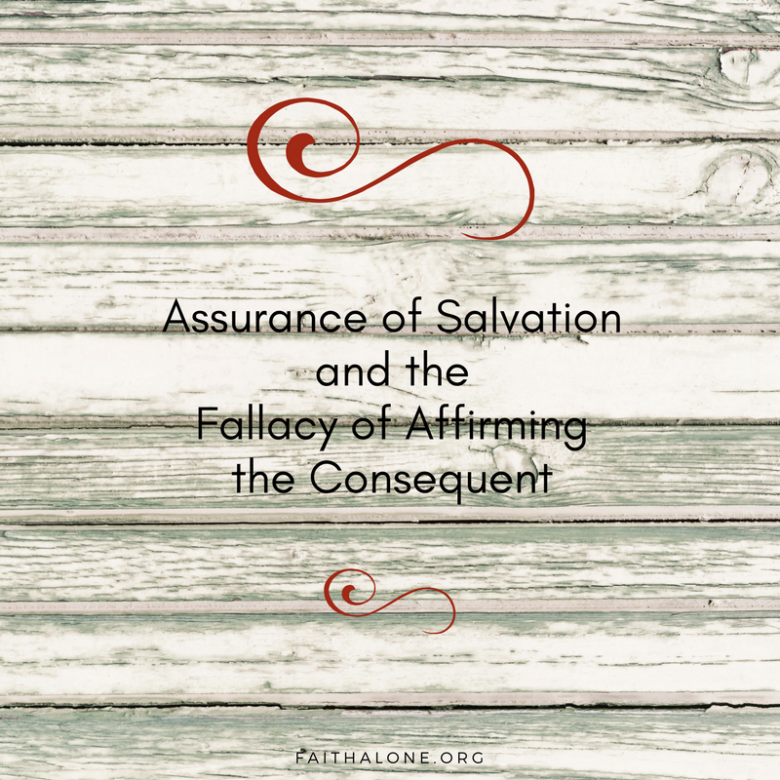There are two standards for evaluating a logical argument. First, is it true? And second, is it valid ? When an argument has true premises and is deductively valid, it is called sound.
According to the first standard, in order for a logical argument to be true, the premises must be true. That’s common sense. Earlier, I wrote an article explaining the difference between true and false premises when it comes to assurance. Obviously, Biblical assurance must be based on true premises, not false ones (see “Assurance Made Simple”).
In this post, I want to address the second standard, i.e., the validity of the argument for assurance. In order to have Biblical assurance, your argument must not commit any logical fallacies.
The Fallacy of Affirming the Consequent
Many people base their assurance on a logical fallacy called affirming the consequent.
Formally speaking, this is what it looks like:
If p then q.
Q.
Therefore, p.
If you didn’t follow that, here’s an example in plain English, using my three-year-old son, Zane:
Premise 1: If Zane falls off his bed, he will have a bump on his head.
Premise 2: Zane has a bump on his head.
Conclusion: Therefore, Zane fell off his bed.
Do you see the problem? Do you see why the conclusion does not necessarily follow from the premises?
(If you know my son, Zane, you will!)
Ever hear the expression, “Some people get all their exercise by jumping to conclusions!” Well, that’s the essence of the fallacy of affirming the consequent. It jumps to conclusions. The conclusion fails to consider other possibilities that might explain the second premise. Just because Zane has a bump on his head does not mean he must have fallen out of bed. There are dozens of different explanations (believe me, I know!). Zane could have fallen out of a tree, or off a swing, bike, or scooter. His sister could have hit him on the head with a bat, stick, baseball, branch, rock, or book. He could have run into a door, wall, or window. Yes, it is also possible he could get a bump on the head by falling out of bed, but that is only one option among many.
That’s the fallacy of affirming the consequent.
Illogical Assurance
Likewise, many people base their assurance on the same illogical reasoning. They jump to conclusions without considering other possibilities. For example, they might reason this way:
Premise 1: Saved people do good works.
Premise 2: I do good works.
Conclusion: Therefore, I am saved.
Do you see the problem?
Assuming the premises are true, this still commits the fallacy of affirming the consequent because being saved is not the only explanation for why you might do good works. Maybe you do good works because you’re a Muslim, or a Jehovah’s Witness, or a Buddhist, and your religion demands you do good works. Maybe you do good works because you’re trying to earn your salvation. Or maybe you do good works because it’s your job, or you want to run for public office, or you want to get a scholarship to college, or you want to impress a girl. Being “saved” is only one possible explanation among many for doing good works. Hence, the conclusion does not necessarily follow from the premises. It is invalid.
Here’s another example:
Premise 1: Saved people feel a strange warming in their bosom.
Premise 2: I felt a strange warming in my bosom.
Conclusion: Therefore, I am saved.
Once again, leaving aside whether the two premises are true (the NT does not teach saved people will have a strange warming in their bosom!), this commits the fallacy of affirming the consequent because there are other reasons why you might have a strange warming in your bosom. Maybe you ate some ghost pepper hot sauce, or ran a marathon in Texas during the summer, or are going through menopause, or are having a mild heart attack. Being “saved” is not the only explanation and it is illogical to think so.
(For a complicated, but thorough, philosophical discussion about the fallacy of affirming the consequent, see here.)
Biblical Assurance Must Be Deductively Valid
Biblical assurance must be valid. It cannot commit any logical fallacies. So how should you think about it?
The simplest way is as a deductive syllogism. Here it is:
Premise 1: Jesus promised, “He who believes has eternal life.”
Premise 2: I believe.
Conclusion: Therefore, I have eternal life.
That is a valid argument. The conclusion necessarily follows from the premises.
I believe this way of approaching assurance is implied in the promise of life itself. When Jesus’ makes that promise, He is inviting you to believe it, and therefore, to draw the appropriate conclusion. If Jesus promises believers everlasting life, and you believe, then what do you have? Everlasting life.
You can see this reasoning at work in the conversation between Jesus and Martha (see John 11:25-26). Jesus tells her that whoever believes in Him will never die, and asks if she believes that. When she answers, “Yes, Lord, I believe,” Martha could draw the appropriate conclusion.
Premise 1: “Whoever believes in Me will never die. Do you believe this?”
Premise 2: “I believe.”
Conclusion: Therefore, I will never die.
This argument is not only true (because it is based on true premises), it is also valid (because the conclusion necessarily follows from the premises). In other words, what I call the “Assurance Syllogism” is sound. If you believe it, then you are assured of your salvation.


